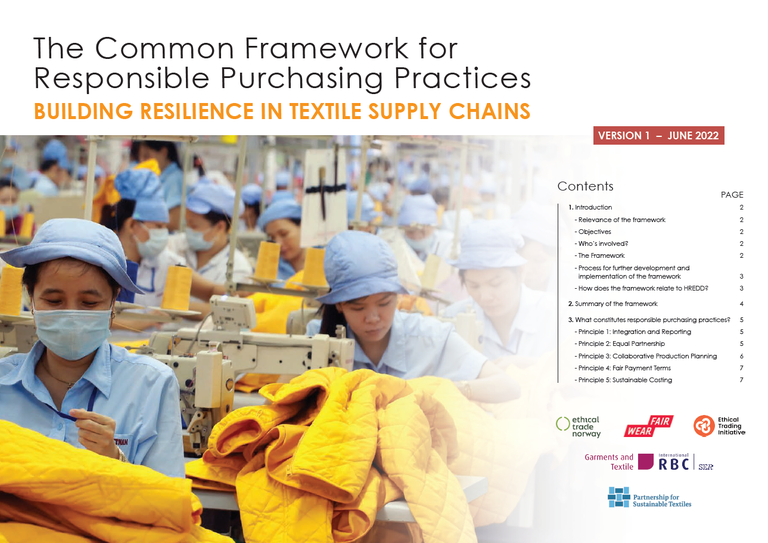Common Framework for Responsible Purchasing Practices: Aligning and driving action on ‘Responsible Purchasing Practices’

Responsible purchasing practices can go a long way in reducing negative impacts on workers in supply chains. They have the potential to support and enable improved working conditions, the implementation of living wages and better planning and business sustainability among suppliers.
The impact of poor purchasing practices
There is growing evidence that poor purchasing practices by some brands and retailers have contributed to and even driven human rights issues in supply chains. This trend prevails even where issues such as low wages and long working hours are prohibited in those same companies’ own human rights policies and standards.
Studies by the International Labour Organisation, Better Buying Institute and the Joint Ethical Trading Initiatives amongst others have evidenced this link. Late sign off and changes in product requirements or volumes can result in long working hours for workers and increased use of temporary workers and subcontracting. Only 17% of suppliers responding to an ILO Global survey said that their orders had long enough lead times. Over half (52%) of textile clothing suppliers said that they accepted prices lower than their production costs and a third of these said this made it difficult to pay workers’ wages and also had an impact on business sustainability. Long payment terms of more than two months also means that suppliers are holding the financial risk and this can make their businesses vulnerable.
Companies have a duty to conduct human rights due diligence for their international activities and revising their purchasing practices is an important element of this. A group of MSIs have decided to collaborate to support this work by aligning a common understanding of what Responsible Purchasing Practices (RPP) involve.
A framework for a common understanding of RPP
The MSI Working Group on Purchasing Practices (the Working Group) includes representatives from the Ethical Trading Initiative (ETI), ET Norway and Denmark, Fair Wear (FW), Partnership for Sustainable Textiles (PST) and representatives of the former-AGT (Dutch Agreement for Sustainable Garments) and potential NGA (New Generation Agreement) and consulted with Better Buying Institute, ACT, ILO Better Work and the Sustainable Terms of Trade Initiative. This Working Group released the draft framework (CFRPP), in November 2021 to discuss with stakeholders, based on a benchmarking exercise of a wide range of documents on the topic. The Working Group has now finalised the document, after evaluating and incorporating feedback from a wide range of stakeholders. 34 organisations actively contributed with detailed suggestions and proposals. A document has been shared with the updated framework, to summarise the feedback given and how it has been integrated. The framework groups different aspects of RPP into five Principles: Integration and reporting, Equal partnership, Collaborative production planning, Fair payment terms and Sustainable costing.
The MSI Working Group hopes that the framework will help to focus attention on the changes needed, as a contribution to improved impact. Working Group members have committed to jointly raise awareness and drive action on purchasing practices in the wider stakeholder community, including amongst policy makers. They will also work to integrate the framework into their existing systems for supporting and assessing improvements by their members, and to align these efforts as far as possible. The Common Framework is featured on The Industry We Want’s website as a ‘spotlight initiative’, which is an example of the industry’s efforts to align toward a common goal.
Supporting practical improvements with companies
Moving forward, the MSI Working Group on Purchasing Practices is mobilising companies committed to taking new actions to improve their purchasing practices. A group of these companies will join a peer-learning environment for two years from September 2022, called the ‘Learning and Implementation Community’ (LIC). Clothing retailers and brands from a wide range of countries including Belgium, Germany, the Netherlands, Norway and the UK, will be involved in a series of online interactive workshops, which will include discussions and problem solving with suppliers on particular topics. The MSI Working Group is working closely with the Sustainable Terms of Trade Initiative to ensure that suppliers are part of discussions, which remains essential as steps are taken towards a fairer relationship and dialogue between suppliers and buyers. The LIC will be developing resources including guidelines, case studies, tools and video resources that will be shared more widely so that other companies and stakeholders can benefit from the learning of the community.
The LIC is funded by the Initiative for Global Solidarity (IGS) implemented by Deutsche Gesellschaft für Internationale Zusammenarbeit (GIZ) GmbH (supported by the German Federal Ministry for Economic Cooperation and Development) and the Sustainable Textile Initiative: Together for Change (STITCH) (supported by the Dutch Government).
The framework recognises and emphasises that the responsibility to respect human rights and environmental standards in textile supply chains cannot be placed solely on suppliers, but that purchasing companies must also take responsibility. Action needs to be taken by purchasing companies to amend their purchasing practices, where these undermine good working conditions. The framework from the MSI Working Group helps to focus this action by providing a reference of what responsible practices look like and the Learning and Implementation Community will also contribute to this goal by supporting practical action by companies.
If you are a member of one of the MSIs involved, specialise in textile and or footwear and wish to join the LIC, please contact info@cfrpp.org before mid-August.
For more information click here or email info@cfrpp.org
